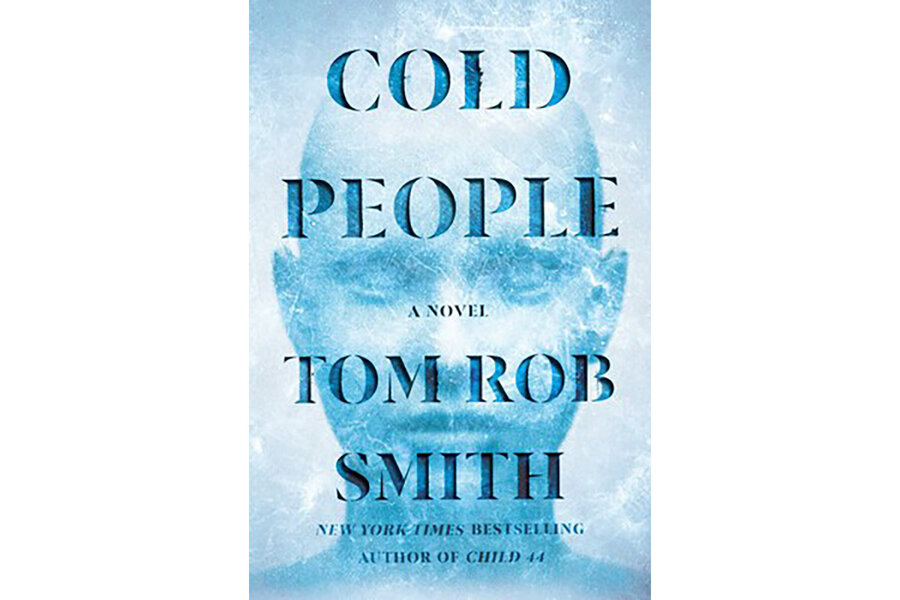Sci-fi novel ‘Cold People’ explores ethics of human bioengineering
Loading...
What if humanity drastically downsized, and without years of planning, was forced to call Antarctica home? What would towns look like? How would diets evolve? What would people wear … and do? Most importantly, would these tested-and-tried inhabitants succeed in surviving, laying the foundation for future generations?
In Tom Rob Smith’s fascinating new science fiction adventure “Cold People,” faceless alien invaders (displeased, it’s posited, with humans’ poor stewardship of Earth) give the population 30 days to migrate to the planet’s most inhospitable continent. Those who fail to reach the icy shores vanish into the ether. The roughly million individuals who make it are humanity’s last, shivering gasp. Anyone who tries to leave is never heard from again.
English author Smith jump-started his writing career in 2008 with “Child 44,” a bestselling thriller translated into more than 30 languages, heaped with awards — including the Crime Writers’ Association Ian Fleming Steel Dagger Award – and long-listed for the Man Booker Prize. He’s also a celebrated scriptwriter of such shows as “London Spy” and “MotherFatherSon.”
In its first pages, the novel offers glimpses of humanity’s earliest interactions with Antarctica. Ui, a Polynesian explorer solo-sailing south 2,000 years ago, gapes at the first sight of icebergs and marvels at the surprise sweetness of snow: “It was fresh like rain, as though these islands were clouds that had crashed into the sea.” The story then flashes forward to the 1870s on South Georgia Island, where seal-industry functionaries witness the decline of the trade; before finishing at McMurdo Station in 2008 with an Antarctica veteran’s mental unraveling. This quick scroll through history serves as an effective opener, establishing the wonder, challenge, and trepidation that have defined humanity’s relationship with the continent.
“Cold People” then shifts to the warmer waters of present-day Portugal. Liza, a studious third-year medical student vacationing with her family in Lisbon, finds herself drawn to a friendly, handsome boatman hustling river cruises. After some quick, flirty banter, the guide – a local named Atto – invites Liza to meet him for a sunset trip “to the edge of the ocean, where all adventures begin.” Intrigued, she slips away for the rendezvous, a leap of faith that launches their relationship and saves their lives.
Upon their return, Liza and Atto realize the world has, in a blink, erupted into chaos. Alien ships hover in the skies and those 30-day evacuation orders, communicated in whatever language and mode the listener needs, are sinking in. The ensuing rush to find family, secure transportation, and head south includes a few it’s-the-end-of-the-world-so-everyone-panic tropes, but also fresh imagery and character-building moves that serve the story well.
Quick wits and creative thinking help Liza and Atto reach the ice; flexibility and ingenuity enable them to endure it. Twenty years have passed (it’s now 2043), and humans are in many ways healthier and heartier than they’ve ever been thanks to constant exercise, a sea-based diet, and a community-first mindset. Still, threats persist – exposure, injury, the mental strain of long, dark winters.
Alarmed by the prospect of humankind’s extinction, surviving scientists have been hard at work developing a new strain of humans better suited to the harsh southern climate. The project, dubbed Cold People, has produced a generation of Ice-Adapted Children “with no experience of the warm worlds except as history lessons taught at school.” One such child belongs to Liza and Atto. A six-foot-six teenage girl – hairless, tough-skinned, her eyes “a matrix of tiny hexagons” – Echo thrives in the cold; she sees subzero temperatures in color and even swims in the ocean while her “ordinary-born” admirer Tetu watches from the shore.
As the novel progresses, a darker side of the Cold People project begins to emerge. Women who volunteer for the effort, as Liza did, aren’t returning from McMurdo City, the scientific hub of Antarctic life. There are whispers that the initiative has had setbacks, creating beings that could harm, rather than help, humanity.
A window into this secret world comes courtesy of Yotam, an Israeli soldier from a strict Jewish family, who survives both the chaos of the aliens’ arrival and the taxing trip south after saying farewell to his beloved, a fellow soldier named Eitan. Brilliant, disciplined, and profoundly lonely, Yotam receives an invitation to join the nascent Cold People project by founding ideologue Song Fu. “We’ll do things that no person has ever done before,” she explains in her pitch. He says yes.
From there, the novel unfolds at a galloping pace as the dangers posed by the project’s bold human genome experiments start to leak out. Echo, Tetu, Liza, and Atto get caught in the action, increasing the emotional stakes, as the story skates and skitters to its climactic showdown.
Smith shines strongest when detailing the workings of his frigid new world, a place of limited resources and 20-year-old technology that demands innovative solutions for everything from clothing and housing to food and factories. His solution for what to do with Earth’s myriad surviving leaders is particularly apropos: the Ex-Presidents Bar and Social Club, where past bigwigs serve patrons, wipe counters, and deploy their gifts of gab.
Also compelling are the questions the novel raises about innovation and ethics, as well as the very nature of being human. Is the purpose of the Cold People project to help humanity in its current form survive – or is something human-ish tolerable? And when should the genetic manipulation stop? “We’ve played God not out of hubris but out of necessity,” argues the president in a key scene, unaware of the ethical boundaries already bulldozed and the growing menace nearby.
“Cold was a different way of life,” admits the early explorer Ui at the start of the book. Smith ably proves just that, while sounding the alarm about experimentation run amok. “Cold People” leaves its mark – it’s a propulsive ride through a well-built world.








